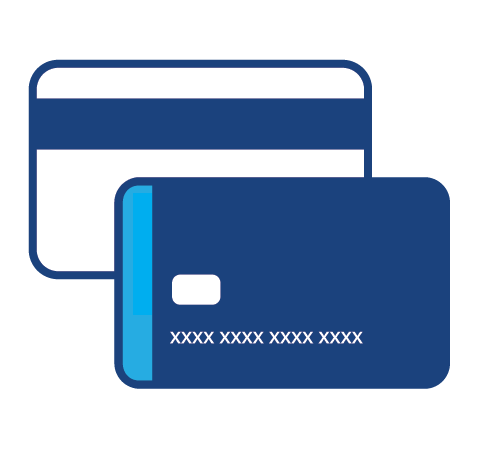Cash vs. Credit vs. Debit – When to Use What

This article is brought to you by Credit Service Union’s Visa Everyday Card with numerous benefits and no hidden fees*.
Over the past five years or so, I’d gotten into the habit of never carrying cash. Why would I need it? Everywhere I go takes credit cards, and if I need to pay a friend for something, well, there’s an app for that.
Then, within a few months’ span, I got into a debate with a friend who told me the mentality of “everywhere takes credit” is very millennial and urban-centric; had an embarrassing incident in which my husband and I bought gelato thinking the gelato shop accepted credit cards (they didn’t, we realized, after already holding the creamy treat in our cashless hands) and started hanging out with some folks who just refused to download payment apps. On top of that, I was now working at a credit union with an ATM downstairs – I really no longer had any excuse to not have cash on me.
But, was the sentiment that credit was king actually elitist of me? Yes, it’s true that I am a millennial who’s mostly lived in large cities, and I love convenience … but, I also love getting points. And while I still stand by my preference of using credit cards to pay for most things, I must concede that there are also good reasons to use cash or a debit card. Here are some tips on the pros and cons of all three, and when to use what.
When to Use Cash
Well, you should obviously have some cash on you when you go to the gelato shop! Seriously, though, there are a number of vendors and smaller shops that are cash-only, so make sure you’re prepared. Some independently run businesses – such as salons or food trucks – will also give small discounts for using cash, since they have to make up for fees charged when processing credit cards. These same businesses also appreciate you having cash for tips.
Paying for things with cash can also be a budgeting trick for many people. For example, if you are trying to limit the amount of money you spend on treating yourself to coffee or after-work drinks, you can set aside a certain amount of cash every week and promise to only use cash for those purchases. Once that cash is gone, bye-bye double lattes! In fact, studies have shown that using cash helps curb people from making unhealthy or impulse buys, such as unhealthy food products.
When to Use Debit Cards
A debit card can be a great happy medium between the convenience and security of a credit card, and the built-in budgeting of only having cash to spend. While credit cards may give their users a false sense of security about how much money they have, using your debit card allows you to automatically see how much money you have left in your checking account. Plus, unlike cash, if you lose your debit card, you can cancel the card and get a replacement card issued. And, if you do need cash and don’t have an ATM nearby, many vendors will allow you to use your debit card to get cashback.
When to Use Credit Cards
While some people may avoid credit cards because they may negatively impact their finances, opening a credit card is often the first step to establishing your credit history, which you’ll need if you ever apply for an auto loan, mortgage, or even a home rental. The key is to use your credit card responsibly. If you are just starting out and are limited to what type of credit card you can open, look into a starter credit card account such as Service Credit Union’s Visa® Everyday Card.
Both credit and debit cards provide protection against fraud. If your card gets lost or stolen, you will not be held liable for fraudulent charges. Many financial institutions also make it easy to keep tabs on your card usage with SMS alerts or apps that alert you to your card usage, so you’ll know right away whether someone else is using your card. With Service CU’s My Cards feature, you can set spending alerts and get notifications about suspicious activity on your card. Because of their built-in security, credit cards are often used when traveling. Plus, you’ll usually get better rates for foreign exchange fees with credit cards than by exchanging currency. In fact, some credit cards offer no foreign transaction fees at all.

Last but not least: Points, points, points. As you may have noticed from all the material that comes into both your physical and digital mailbox on a weekly basis, credit card vendors can have multiple points programs that reward you for spending with your credit card. Depending on your own lifestyle, you can pick a card that gives you cashback, travel points, discounts on specific vendors, or all of the above. Just watch out for monthly fees when it comes to some higher-end cards.
Of course, credit cards can become dangerous when you’re not paying them off regularly. If you can, opt for automatic monthly payments on your card from your checking account and make sure your statement balance is paid in full so you don’t end up getting hit with crazy interest payments. Check-in on your card spending regularly and make sure you’re sticking to your predetermined budget. For example, you might want to calculate how much you spend on housing and other bills every month, set aside a designated amount for savings/an emergency fund, and then come up with a set amount you can dedicate to purchases. Happy spending!
*Annual Percentage Rates (APR) range from 8.15% to 16.15%; accurate as of 02/16/2021 and subject to change without notice. APR is variable and based on your creditworthiness. The cash advance fee and balance transfer fee is 1.00% of the amount of each transaction. $20, or the amount of the required minimum payment, whichever is less, will be assessed for a returned payment fee. The card replacement fee is $9.00. Should you request a rushed or emergency card replacement, a fee of $40.00 shall be assessed. There is a document copy fee of $15.00.
